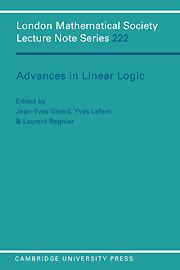Book contents
- Frontmatter
- Contents
- Preface
- Linear Logic: its syntax and semantics
- Part I Categories and semantics
- Part II Complexity and expressivity
- Part III Proof theory
- Part IV Proof nets
- From proof nets to interaction nets
- Empires and kingdoms in MLL-
- Noncommutative proof nets
- Volume of mulitplicative formulas and provability
- Part V Geometry of interaction
Empires and kingdoms in MLL-
Published online by Cambridge University Press: 17 February 2010
- Frontmatter
- Contents
- Preface
- Linear Logic: its syntax and semantics
- Part I Categories and semantics
- Part II Complexity and expressivity
- Part III Proof theory
- Part IV Proof nets
- From proof nets to interaction nets
- Empires and kingdoms in MLL-
- Noncommutative proof nets
- Volume of mulitplicative formulas and provability
- Part V Geometry of interaction
Summary
Abstract
The paper studies the properties of the subnets of proof-nets. Very simple proofs are obtained of known results on proof-nets for MLL-, Multiplicative Linear Logic without propositional constants.
Preface
The theory of proof-nets for MLL-, multiplicative linear logic without the propositional constants 1 and ⊥, has been extensively studied since Girard's fundamental paper [5]. The improved presentation of the subject given by Danos and Regnier [3] for propositional MLL- and by Girard [7] for the first-order case has become canonical: the notions are defined of an arbitrary proof-structure and of a ‘contex-forgetting’ map (·)- from sequent derivations to proof-structures which preserves cut-elimination; correctness conditions are given that characterize proof-nets, the proof-structures R such that R = (D)-, for some sequent calculus derivation D. Although Girard's original correctness condition is of an exponential computational complexity over the size of the proof-structure, other correctness conditions are known of quadratic computational complexity.
A further simplification of the canonical theory of proof-nets has been obtained by a more general classification of the subnet of a proof-net. Given a proof-net R and a formula A in R, consider the set of subnets that have A among their conclusions, in particular the largest and the smallest subnet in this set, called the empire and the kingdom of A, respectively. One must give a construction proving that such a set is not empty: in Girard's fundamental paper a construction of the empires is given which is linear in the size of the proof-net.
- Type
- Chapter
- Information
- Advances in Linear Logic , pp. 249 - 270Publisher: Cambridge University PressPrint publication year: 1995
- 10
- Cited by

